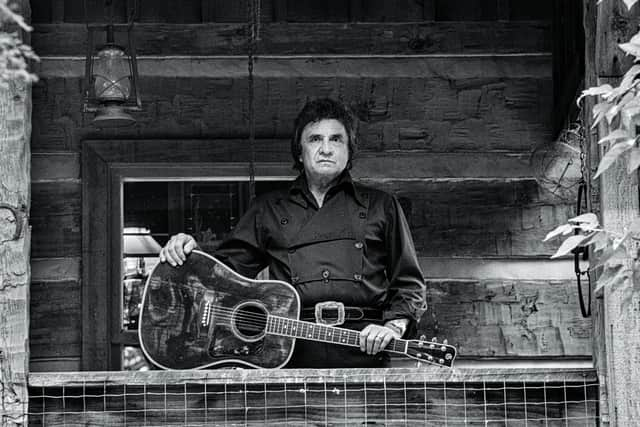Johnny Cash Songwriter review - 'His best songs here are the portraits of ordinary folks'
Johnny Cash: Songwriter (Mercury Nashville) ***
Kate Nash: 9 Sad Symphonies (Kill Rock Stars) ***
Linda Thompson: Proxy Music (StorySound Records) ****


Songwriter captures Johnny Cash at a career crossroads in the early Nineties, as in love with music as ever but no longer as appreciated as the country trailblazer of earlier decades. These previously unreleased recordings from 1993 were made shortly before Cash met Rick Rubin and embarked on his golden years as a reinvigorated interpreter of songs ancient and modern.
The album has been co-produced by his son John Carter Cash who stripped back the original recordings to voice and acoustic guitar and assembled a new studio band including Cash stalwarts Marty Stuart and the late David Roe alongside Average White Band drummer Pete Abbott. They are joined by some cosmic keyboards and mournful strings on opening track Hello Out There, an unexpected interplanetary call for a human race in distress. The sighing strings are back on Spotlight, paired with some moody guitar from special guest Dan Auerbach of The Black Keys.
Advertisement
Hide AdAdvertisement
Hide AdHis best songs here are the portraits of ordinary folks – the struggling single mum rock-a-bying her baby to James Taylor on She Sang Sweet Baby James and the overlooked Vietnam veteran on Drive On embellished with a bit of ’Nam era psychedelics from Cash Jr and Wesley Orbison, son of Roy. As the title suggests, Like A Soldier is more metaphor, about Cash’s own battles with addiction. An alternative version appeared on his 1994 American Recordings album but this version preserves Waylon Jennings’ original backing vocals.
Wife June Carter Cash is never far from his thoughts. Poor Valley Girl celebrates June and the Carter family, with backing vocals by Vince Gill, while country amble I Love You Tonite is an affectionate ode to their enduring love. It’s no Ring of Fire but there is an infectious laugh in Cash’s voice as he exults “can you believe we made it through the Eighties? And will we make the millennium – well, we might.”


Onetime bedroom popster Kate Nash is also in fine voice on 9 Sad Symphonies, following her stint in co-created stage musical Only Gold. Her richer vocal is in songbird effect on Millions of Heartbeats, a big pop production with busy strings and choral backing vocals which captures her pandemic despair but also her resolve. She also digs deep to deliver some soulful vocals on Abandoned, an Arlo Parks-like light blend of pastoral indie and R&B.
It’s not all dolour – some of her old rage is still there on My Bile, couched in hectic, anxious strings and witty chorus line backing vocals and on symphonic dance tune Wasteman (“you’re just a wasteman, I’m going to have to disconnect”).
Linda Thompson, meanwhile, has been robbed of her ability to sing by a rare vocal condition, spasmodic dysphonia. But she can still write beautifully and has recruited a handful of vocalists to interpret her new songs on the playfully titled Proxy Music, with a sleeve which features Thompson posing like Kari-Ann Moller on the playgirl cover of Roxy Music’s self-titled debut.
Thompson is an expert curator of her own music, assisted here by son Teddy on production. Her daughter Kami is the first voice heard on The Solitary Traveller, setting a high bar which is only met by Martha and Rufus Wainwright respectively on timeless piano ballad Or Nothing At All and the bilingual lounge sashay of Darling This Will Never Do.


Eliza Carthy sounds right at home on That’s The Way the Polka Goes, The Unthanks are bewitching storytellers on Three Shaky Ships and The Proclaimers break hearts on Bonnie Lass, while John Grant gets to sing a song called John Grant, about a shared encounter with Thompson.
CLASSICAL
Schoenberg: Expressionist (MusicOrchid Classics) *****
Advertisement
Hide AdAdvertisement
Hide AdIf there’s a “softer” side to Arnold Schoenberg’s music it’s best found among his songs, whether dating from the extended tonality of his earlier works or the freer atonalism that later marked out his radicalism. That in itself gives this revelatory duo album by soprano Claire Booth and pianist Christopher Glynn an unexpected charm. Clever packaging does the trick. They take eight Schoenberg paintings - he was as skilled an artist as composer - illustrating each with a complementary trio of works. All are songs bar two movements from his pithy Op 19 Piano Pieces. Booth and Glynn are a captivating tour de force, from the opening moonlit poeticism and Wagnerian echoes of Erwartung Op2 No1 to the harrowing intensity of Jane Grey Op12 No1, by way of cabaret-style satire and folk arrangement. It’s the world of Austro-German Expressionism with a heartfelt human touch. Ken Walton
JAZZ
Mike Westbrook: Band of Bands (Westbrook Records) ****
Veteran pianist, bandleader and composer Mike Westbrook shows no signs of flagging as he coaxes a forceful big band sound from this septet, with long-time collaborators Chris Biscoe and Pete Whyman both toting alto and soprano saxophones, complemented by reed tone of a different kind courtesy of Karen Street’s accordion. The whirling twin saxes of the opening number, Glad Day, an old Westbrook favourite, give way to another Westbrook tune, the moody slow blues swagger of Blues for Terenzi. Vocalist Kate Westbrook is in scarily stentorian form in several tracks, and in a Friedrich Hollaender number, Black Market, intersperses lyrics with an extraordinary stream of snorting, growling vocalising – think Kurt Weill let loose in a farmyard. Billy Strayhorn’s Johnny Come Lately sees both saxophonists and accordionist let rip, while in the celebratory What I Like, Kate elicits banter and ebullient instrumental responses from her bandmates. Jim Gilchrist